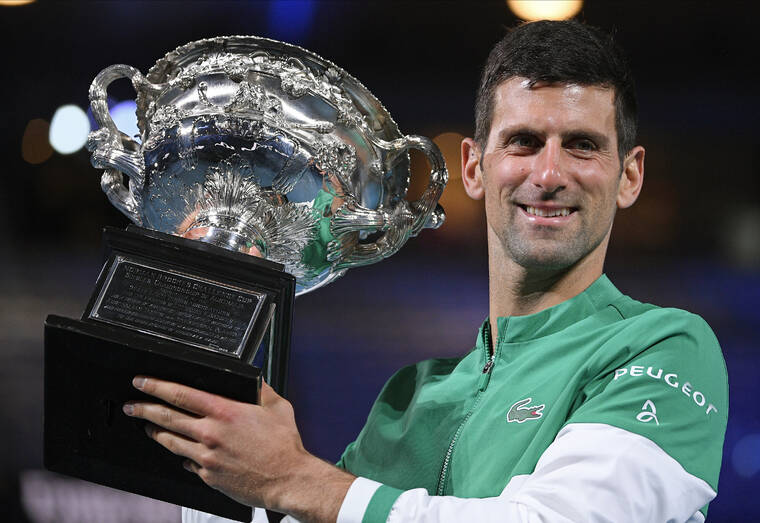Novak Djokovic’s fight to play tennis could be just starting
Novak Djokovic has fought through adversity of his own and others’ making for as long as he has been playing tennis.
He beat extraordinary odds to become a champion, emerging from the former Yugoslavia despite economic hardship and a conflict that turned Serbia, his homeland, into an international pariah and made it difficult for him to travel and train. Once on tour, he had to contend with Roger Federer and Rafael Nadal, well on their way to becoming two of the game’s greatest players. Djokovic caught up to them and now holds a career edge in both rivalries. He has also been ranked No. 1 for 356 weeks, a record.
Djokovic, stubborn and resilient, has had tougher fights in his career than the one he has faced this month with the Australian government over his visa. But this battle, which continues, is unlike any other he has encountered. It could do him lasting damage despite his surprise victory in Australia on Monday, when a federal court overturned the revocation of his visa on procedural grounds. The ruling still does not guarantee he will not be deported by Australian immigration authorities before the Australian Open, which begins next Monday.
Djokovic’s five-day detention, ended by the court ruling, was a blink of the eye compared with the detentions of some long-standing asylum-seekers with whom he shared his Melbourne hotel. Djokovic, unlike some of his fellow lodgers, was also free to leave the country at any time. But the experience had to be draining, and it came after a phenomenal but emotionally taxing season in which he came within one match of achieving a Grand Slam before losing the U.S. Open final to Daniil Medvedev. He was also beaten at the Olympics and the ATP Finals by Alexander Zverev.
Based on transcripts provided to the federal court, he landed in Melbourne near midnight Wednesday with the seeming belief that all his papers were in order, including his medical exemption from vaccination. He soon learned otherwise.
Although it is highly unlikely that Djokovic, an outspoken skeptic of vaccines, will find himself sequestered again in any other country over visa issues, the trouble in Melbourne presages some of the headwinds he could face in the months ahead if he continues to attempt to travel the world without being vaccinated for COVID-19.
Governments are running out of forbearance in instituting or debating vaccine mandates, and some tennis officials are running out of patience, too. And the pace and direction of the coronavirus pandemic and its variants are unknown.
The next major events on tour after the Australian Open are the Masters 1000 events in Indian Wells, California, and Miami, which both start in March. But the United States now requires that visitors be fully vaccinated to travel to the country by plane unless they are U.S. citizens, lawful permanent residents or traveling on a U.S. immigrant visa. Only limited exceptions apply, and it is unclear whether Djokovic would qualify for one or would even want to try to qualify for one after the Australian imbroglio.
The French Open, which is the next Grand Slam tournament of the season after the Australian Open, begins in May and appears less problematic. The French sports minister, Roxana Maracineanu, told French national radio last week that she expected Djokovic would be allowed to enter the country and compete if unvaccinated because of the health protocols that are planned for major international sporting events in France.
But in the same interview, Maracineanu emphasized that any athlete, French or foreign, who was a resident in France would be required to show proof of vaccination to have access to sports training facilities. That is a sign of which way the mistral is blowing. Some professional leagues have left loopholes in place, but gaps are also closing for the unvaccinated.
Djokovic, who has long held nontraditional views on science and taken unorthodox approaches to his health, finds himself in the distinct minority with more than 90% of the top 100 players on the ATP Tour now vaccinated. If the ATP has made no official statements of public support for Djokovic during his detention, that might not be because Djokovic is now leading a new player group that has been critical of the ATP but because the ATP has pushed increasingly hard for its members to be vaccinated.
In 2022, the tour will not require vaccinated players to take more than an initial test once they arrive at a tournament unless they develop symptoms. Unvaccinated players and team members will have to be tested regularly, and the tour will no longer cover the cost of follow-up testing for the unvaccinated.
That will pose no hardship to Djokovic, who has earned about $154 million in career prize money and hundreds of millions more off court. But the tour rules do emphasize that Djokovic and the few remaining unvaccinated players are outliers.
The Australian authorities have hardly wrapped themselves in glory during L’Affaire Djokovic. There were mixed signals, conflicting memos and other miscommunication between state and federal officials and Tennis Australia, which runs the Australian Open.
If there had been a united, coherent effort that sent a clear message about the grounds for medical exemptions from vaccination, Djokovic’s overnight interrogation and visa cancellation could have been avoided.
He most likely would not have risked going to Australia if he had understood that the federal government did not consider a recent case of COVID to be grounds for an exemption. But while Djokovic won in court Monday, he has undoubtedly lost support in some chambers of the court of public opinion, although he has become a martyr for the anti-vaccine movement and among his countrymen.


